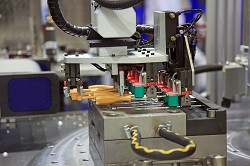Monitoring tools promise polymer processing efficiencies
Europe’s processing industries increasingly recognise the need to adopt more sustainable models of manufacturing in order to ensure continued growth and global competitiveness. This means identifying and putting in place greener technologies and more efficient processing systems that can reduce waste and emissions while increasing throughput. In order to address this critical challenge, the EU-funded COOPOL(opens in new window) has developed new methods and tools that could put Europe’s polymer sector at the forefront of intensive, low-impact sustainable production. ‘The focus of COOPOL has been on the polymer sector, a key area of importance to the European chemicals Industry,’ explains project coordinator Professor David Haddleton from the University of Warwick in the UK. ‘By combining industrial and academic partners, the project has been able to deliver significant improvements in polymer processing and produced tangible and exploitable benefits for the sector.’ Polymers are integral to our lives. From plastics to adhesives, polymer production is increasing on an annual basis and the sector is a significant employer both in the EU and globally. A key issue however has been that many of these polymer products are manufactured using batch and semi-batch reactors, with process parameters – such as temperature and feeds – following a specific time schedule. Unexpected variations in operating conditions, such as changes in feed purity, inevitably lead to variations in polymer structure and to off-spec products. The COOPOL project has addressed these limitations by developing real time monitoring for industrial polymerisation processing, enabling closer control over material properties in order to improve performance and processing consistency. This new process control approach links molecular level information and understanding of reaction chemistry with real-time sensing, model-predictive control and economic optimisation tools. Continuous processing to replace traditional batch processing has also been introduced in order to improve throughput and product yield. A further important achievement has been the development of sensor fusion, which allows for the processing of several data simultaneously such as heat flow, surface acoustic wave, temperature and conductivity. European companies involved in the project now stand to benefit from the results. ‘Large polymer producing companies such as BASF, DSM, Evonik, Arkema, Merck as well as smaller producers such as Synthomer, Scott Bader and Cornelius Specialties now have the means to achieve improved efficiency of their polymerisation production,’ says Haddleton. ‘Probe and measurement companies will also benefit, by having new technology and applications for their existing projects, while SMEs such as Cybernetica have been able to develop tailor-made control and measurement systems. In sum, this project will help EU countries to compete on the world stage by keeping processes as efficient as possible.’ The project, officially completed in February 2015, culminated with an industrial process demonstration at a BASF pilot plant. ‘This went extremely well,’ says Haddleton. ‘Many of our results have been published in international academic journals of the highest standing, and a follow-on project funded by the EU will aim to fully implement our findings and further increase the complexity of the systems we have pioneered.’







